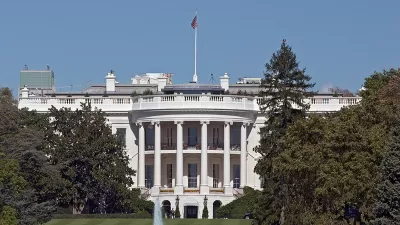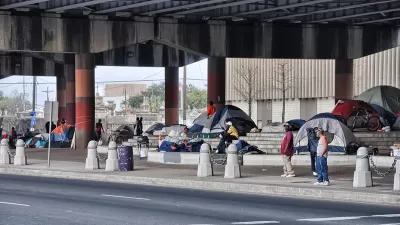Shortly after a tumultuous visit to California focusing on the homelessness crisis in San Francisco and Los Angeles, Trump administration has released a report on homelessness that is already facing criticism.

The Council of Economic Advisors (CEA), which works in the Executive Branch and advises the president on economic policy, has published a new "State of Homelessness in America" [pdf] report that blames the growing homeless crisis in the county on "decades of misguided and faulty policies."
The report emerged in context of a highly contentious visit by members of the Trump administration, including President Trump, to California. The president's parting message: that the U.S. EPA would slap the state with an environmental violation the state implements the president's prescriptions to clean up homelessness (this during the same week as the federal government revoking the state's Clean Air Act waiver).
The president also announced a planned crackdown on homelessness, and Housing and Urban Development Secretary Ben Carson found controversy by reportedly using offensive terms to describe transgender homeless people. Criticism of the visit and the report, from sources reported by Liam Dillon and Benjamin Oreskes for the Los Angeles Times, was swift and thorough.
Critics describe the Trump administration's emerging doctrine on reducing regulations to spur the housing as distinct from the views of the state's socially progressive YIMBY politicians. Some think the president is actually just trolling the state, in fact. Other experts also say the administration's hopes for deregulation to move the needle on homelessness are overstated. There are other differences too, like the report's call for a greater role for law enforcement in cracking down on homeless populations.
Kriston Capps also writes in-depth coverage of the report and the current state of affairs between the Trump administration and the state of California for CityLab, focusing on several of the aforementioned themes as well as another under-reported feature of the Trump doctrine on homelessness: Housing First skepticism.
"Their argument against Housing First relies on supply and demand. It’s a winding, five-part case that holds that by reducing the number of homeless people through programs that don’t set any preconditions or requirements for their participation, Housing First policies might generate outcomes that actually increase the homeless population," writes Capps.
FULL STORY: Trump’s big idea to fix homelessness is to do what California is already doing — sort of

Planetizen Federal Action Tracker
A weekly monitor of how Trump’s orders and actions are impacting planners and planning in America.

Maui's Vacation Rental Debate Turns Ugly
Verbal attacks, misinformation campaigns and fistfights plague a high-stakes debate to convert thousands of vacation rentals into long-term housing.

San Francisco Suspends Traffic Calming Amidst Record Deaths
Citing “a challenging fiscal landscape,” the city will cease the program on the heels of 42 traffic deaths, including 24 pedestrians.

Amtrak Rolls Out New Orleans to Alabama “Mardi Gras” Train
The new service will operate morning and evening departures between Mobile and New Orleans.

The Subversive Car-Free Guide to Trump's Great American Road Trip
Car-free ways to access Chicagoland’s best tourist attractions.

San Antonio and Austin are Fusing Into one Massive Megaregion
The region spanning the two central Texas cities is growing fast, posing challenges for local infrastructure and water supplies.
Urban Design for Planners 1: Software Tools
This six-course series explores essential urban design concepts using open source software and equips planners with the tools they need to participate fully in the urban design process.
Planning for Universal Design
Learn the tools for implementing Universal Design in planning regulations.
Heyer Gruel & Associates PA
JM Goldson LLC
Custer County Colorado
City of Camden Redevelopment Agency
City of Astoria
Transportation Research & Education Center (TREC) at Portland State University
Jefferson Parish Government
Camden Redevelopment Agency
City of Claremont





























